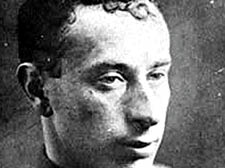|
|
 |
| |

Poet Isaac Rosenberg |
Letters from a poet’s heart
Isaac Rosenberg: Poetry Out of My Head and Heart, unpublished letters. Edited by Jean Liddiard. Enitharmon Press £15. order this book
HE was small, modest, shy, the apologetic son of pathetically poor immigrants from Lithuania. The handful of books about Isaac Rosenberg have tended to be equally small, at least in size – pocket-sized prints about a poet and a painter who died in the First World War, a sad, unhappy soldier killed on night patrol outside Arras, aged 27, on April Fools’ Day, 1918, when victory was almost won.
Poetry Out of My Head and Heart, is also small in size. These letters by Rosenberg, which lay forgotten inside the British Library, are now published for the first time by the Kentish Town-based Enitharmon Press.
They are an astonishing find, a bundle of papers including draft poems that Rosenberg’s friend and mentor Laurence Binyon, the poet and art historian, misplaced during his years working in the British Museum.
They turned up in a battered envelope in 1995 when the British Library made the big move to its new home alongside St Pancras station. And here they are in a neat new book, sensitively edited by Jean Liddiard, Rosenberg’s modern biographer.
Another fascinating factor is the foreword from Rosenberg’s nephew, the late South African freedom fighter and architect Isaac Horvitch, named after his uncle. Ike spent much of his life in Hollycroft Avenue, Hampstead, ensuring that Rosenberg’s indomitable genius was not forgotten.
Indeed, it was the determination of Rosenberg’s family we have to honour for promoting his work, because in the hard years after the First World War he was not a name to conjure with when it came to the admired classic war poetry of the killing years. Now Rosenberg is a colossus, his reputation universally admired and enjoyed. Poems such as Dead Man’s Dump and Break of Day in the Trenches are to be found in every war anthology and his fame is recognised and cherished, with a dedicated place in Westminster Abbey’s Poets’ Corner.
He remains remarkably hopeless and forever apologetic, writing to Binyon from 32 Carlingford Road, Hampstead, his studio for a few months while he was at the Slade, and insisting “forgive the jerky observations but I felt I had to say something even if I could not say what I felt”.
His concern was not the hot immediate anger of brutal, blatant death but, as he wrote to the poet Gordon Bottomley, it was the “dark destiny of man” that enveloped him. “He did not lose faith in the power of his own vision, so resolutely won and held against such odds.”
Jean Liddiard says of Rosenberg: “His vocation, as he saw it, was not merely to speak for his fellow soldiers, as did Wilfred Owen. It was to explore the tragedy of human existence through his acute sensuous apprehension of its vigorous beauty and mortality, captured by his painter’s eye, intensified by the wartime reality of violence and its human cost.”
Perhaps the miracle of Isaac Rosenberg is summed up by a letter written to Binyon by Winifreda Seaton, the middle-aged schoolmistress who encouraged Rosenberg by reading his unsung poems.
From her home at Milton Park, Highgate, she declared: “He died too soon, which cannot be said of Sir Philip Sidney or Keats, with the same deep regret.
“Had he had Rupert Brooke’s advantages he might have expressed himself more perfectly, but when you compare the environment of the two, Isaac Rosenberg is a wonder.”
|
| |
|
 |
|
| |
 |
|
 |
|



